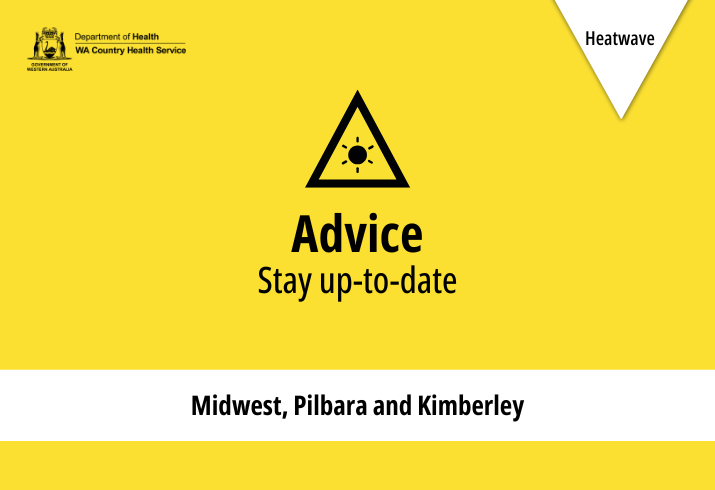HEALTH ALERT: Protect yourself against extreme heat

The heatwave has been downgraded to ADVICE – THREAT IS REDUCED for the Kimberley, Pilbara and Midwest.
Although the extreme heatwave has passed, please remain vigilant for the effects of heat.
UPDATE as at 22 December, 18:00pm: WATCH AND ACT - STAY INFORMED for parts of the Midwest.
A WATCH AND ACT - STAY INFORMED heatwave alert is active for parts of the Midwest, between Mingenew and Coral Bay. Extreme heatwave conditions have largely eased. Widespread severe heatwave conditions continue to impact large parts of the region.
A WATCH AND ACT - PROTECT YOURSELF AGAINST THE IMPACTS OF EXTREME HEAT alert remains in the Kimberley and Pilbara including Broome and north of Port Hedland.
UPDATE as at 20 December, 17:00pm: WATCH AND ACT - MONITOR CONDITIONS for parts of the Kimberley and Pilbara.
The heatwave has been upgraded to WATCH AND ACT - PROTECT YOURSELF AGAINST THE IMPACTS OF EXTREME HEAT for the Kimberley and Pilbara including Broome and north of Port Hedland.
A WATCH AND ACT - MONITOR CONDITIONS alert remains for people in the Midwest, between Mingenew and Coral Bay.
UPDATE as at 19 December, 18:00pm: WATCH AND ACT - MONITOR CONDITIONS for parts of the Midwest.
The heatwave has been upgraded to WATCH AND ACT for parts of the Midwest, between Mingenew and Coral Bay. Protect yourself against the impact of severe to extreme heat.
People in the Pilbara and Kimberley, between Port Hedland and Derby, should continue to be prepared for extreme heat.
Current as at 18 December, 14:02pm: ADVICE - PREPARE NOW
WA Country Health Service is advising people in the Midwest, Pilbara and Kimberley - between Mingenew and Coral Bay and between Port Hedland and Derby to prepare for extreme heat.
A heatwave is forecast to impact these areas in the next seven days (until Monday 23 December 2024).
Heatwaves can affect:
- Babies and young children
- Older children and teenagers
- Pregnant women
- Older people
- People with existing physical/mental health conditions or on certain medications
- People that exercise in the heat
Health safety advice:
- Seek a place to keep cool, such as your home, a library, community centre or shopping centre.
- Close your windows and draw blinds, curtains, or awnings early in the day to keep the heat out of your home.
- If available, use fans or air-conditioners to keep cool.
- Keep hydrated by drinking plenty of fluids. Fluids include water, diluted juice (mixed with water) and low sugar sports drinks.
- Limit or avoid alcohol and caffeinated drinks (including tea, coffee, and energy drinks) as these can increase dehydration.
- Limit time outdoors. If you need to go outside, try to do so in the early morning or late evening. If you do go outside make sure to put on a hat and sunglasses, apply sunscreen and try to stay in the shade.
- When outdoors, wear lightweight, light-coloured, and loose-fitting clothing that covers as much skin as possible.
- Sleep with just a sheet over you in the coolest part of the house. Remove winter bedding and replace it with lightweight, cotton bedding.
- Wrap medications needing refrigeration in foil or heat repellent containers with an icepack to keep them cool if there is a power outage.
- People travelling to this area are urged to keep additional food and water and ensure vehicle preparedness steps are undertaken.
- Plan outdoor and strenuous activities for days and times forecast to be coolest.
- Stock up on bottled water if possible.
- Get a battery powered radio with working batteries.
- Charge mobile devices in the event there is a power outage.
- Tell elderly neighbours and other vulnerable people about the hot weather coming.
- Make sure you have shelter ready and water for pets and other animals.
- If you have an air-conditioner, check it is working.
For information on staying safe during a heatwave visit HealthyWA - Heatwaves and Working Safely in Hot Conditions.

